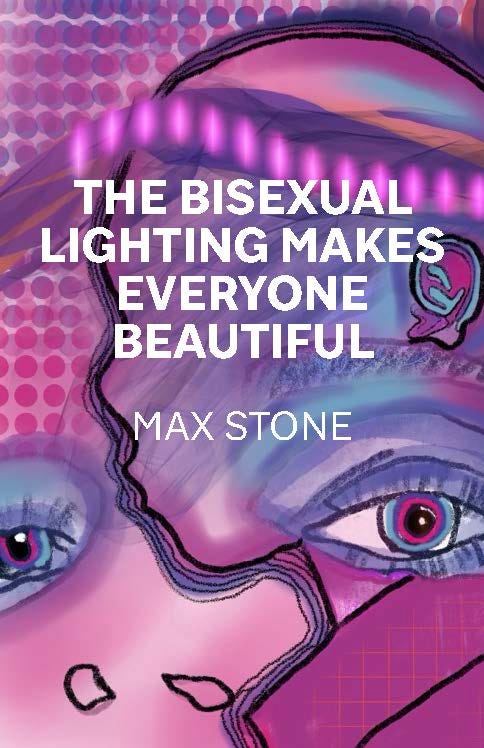In each installment of “The Usonian Interviews,” The Usonian spotlights a storyteller from a different corner of the globe. This week, The Usonian spoke with poet Max Stone about his new poetry chapbook, Temporary Preparations (Bottlecap Press, 2023). You can order the book from the publisher here.
This interview has been edited for clarity and length. The views presented by the interview subject are the opinions of the subject and do not represent the views of the author or this newsletter. Browse the full interview archive here.
THE USONIAN: Tell us about the title — what does Temporary Preparations mean to you?
MAX STONE: It’s about trying to figure out a way to survive amidst the instability we face right now—both in the external world and in the internal world of the speaker. The world is constantly shifting. Temporary Preparations is an attempt to find balance in this unstable landscape.
TU: The chapbook is composed of two long poems—"October Shards" and "Something is always burning." There’s a lot of Reno in both of them. How did Reno inform your poetry?
“October Shards” started as a walking poem. I was literally walking around Reno, just noticing things and considering other thoughts. Reno informed it partly because it was physically where I was and where I was walking. After I got home, I started piecing things together. Because the poem goes in a bunch of different directions, I kind of use the “walking” technique as a tool to bring the reader back to a concrete place. Otherwise, it’s pretty fragmented. Hence the “shards” part of the title.
Reno is complicated for me. I grew up in Reno; then I left and came back. There’s a tension I feel for it, this darkness. It has this push and pull between certain things—Reno certainly has that. I have this desire to leave, but Reno always has a way of pulling back.
TU: Describe your writing process.
MS: My writing process is different for all of my poems. Sometimes I put a bunch of pieces in a document. They may not even go together. But I’ll try to start moving things around and see if I can find some sort of linkage between things. “October Shards” is almost a collage—I have been making a lot of “actual” collages right now.
Especially with the poem “Something is always burning”—it’s a stack of lines that might not be that related at all. But, you can find meaning in-between the lines. Hopefully, people think that there’s some sort of thematic linkage, but I really like the collage style.
Despite that, a lot of my poems are narrative—taking an experience that happened to me, working through it and writing about that. But I like to be discursive, to be in one place and go somewhere else.
And sometimes the Muse visits you and you get lucky. That doesn’t happen that often—you just have to keep going. I’m always trying new things and new ways of working.
TU: Who are your influences as a poet?
MS: Chen Chen is one of my main influences, the first poet I read who was a contemporary poet, back before I was aware that contemporary poetry was a thing. His work blew my my mind. I met him once at AWP, which was super cool. And he follows my Instagram now, so we’re basically friends.
Also Ari Banias. Older figures like Frank O’Hara, James Schuyler, Barbara Guest from the New York School. John Ashbery—but he’s kind of incomprehensible sometimes. I used to live in New York City, so New York is a muse for me.
Tommy Pico. All of his books are book-length poems with pop culture references, and I really like long poems.
I also just went to the Community of Writers Poetry Workshop in Olympic Valley by Lake Tahoe. I got to work with a bunch of legendary poets—Robert Hass, Brenda Hillman, Kazim Ali, Victoria Chang, Evie Shockley. I’ve learned a lot from them and I’ve felt very inspired. That was a great experience.

TU: What do you hope your readers get out of your work?
MS: I hope it sparks something in them. Maybe they have an experience or a feeling or think about something in a different way. For me, the best poetry makes me pause on a line and think about it. Even if I don’t know what the line means, I just like the musicality of the line—something makes me stop and want to read it again because it reflects an observation that speaks to the human experience.
One last thing—fires come into this work. I’m not really sure why that is… but fire is a chance for renewal. It goes back to that feeling of instability and the idea of a looming threat. I’m sure a lot of people are feeling that right now.
Max Stone is a poet from Reno, Nevada. He has an MFA in poetry and a BA in English with a minor in Book Arts and Publication from the University of Nevada, Reno. He was born and raised in Reno, but has lived in various other places including New York City, where he played soccer at Queens College. Max is passionate about building the literary community in Reno, he frequently organizes poetry readings in town and he worked with Nevada Humanities to plan the 2022 Literary Crawl.



